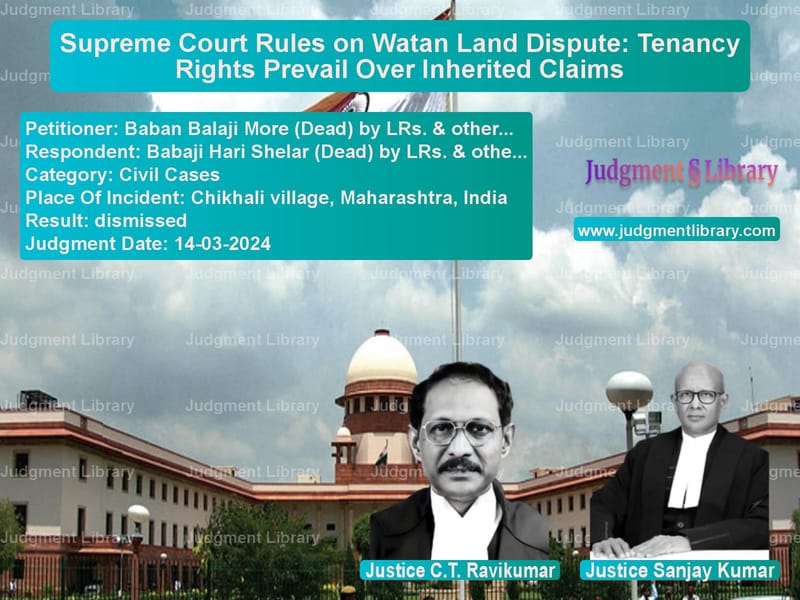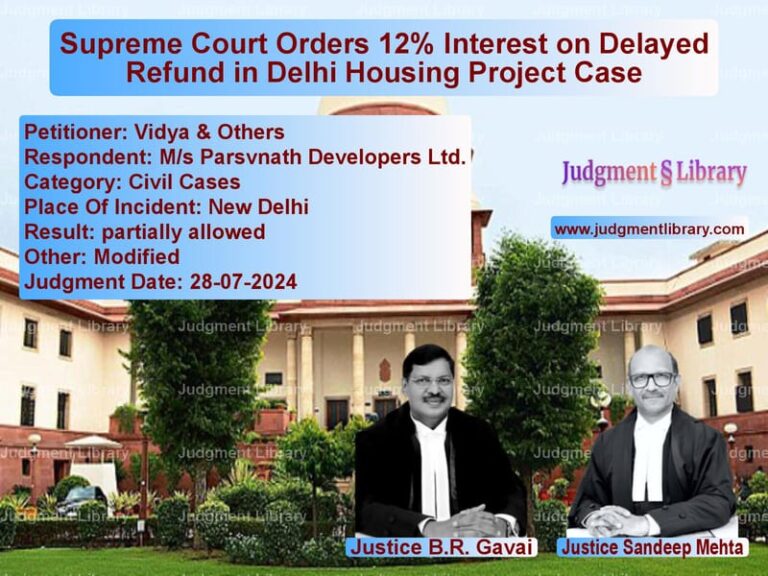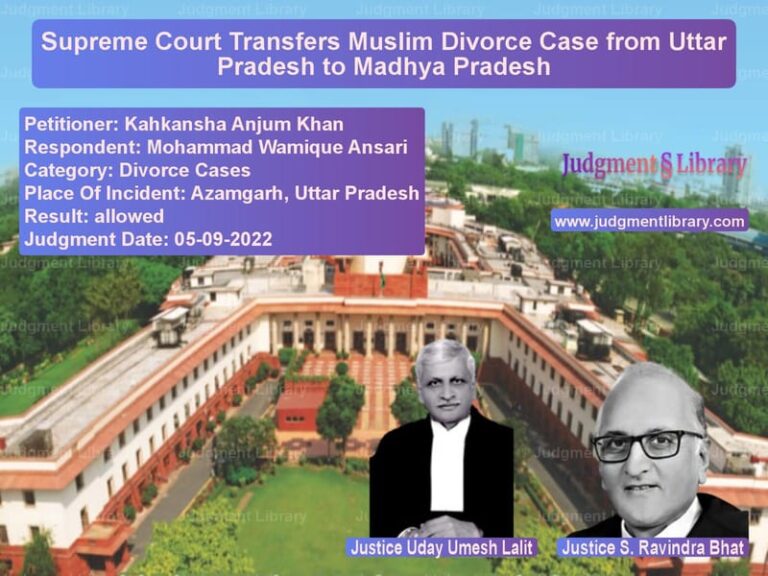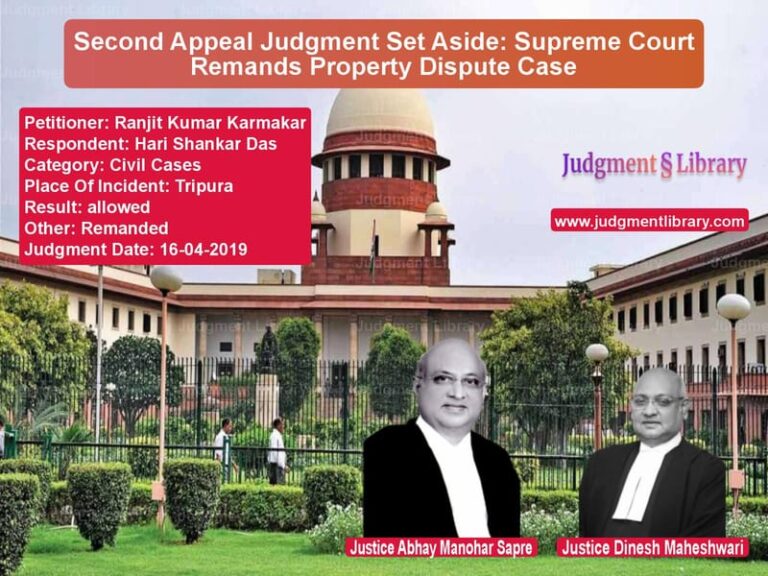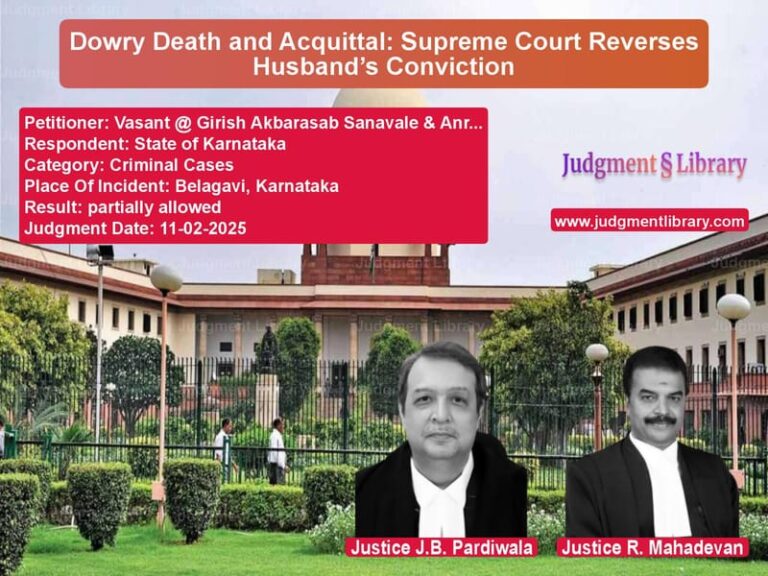Supreme Court Rules on Watan Land Dispute: Tenancy Rights Prevail Over Inherited Claims
The Supreme Court of India recently ruled on a significant property dispute in Baban Balaji More (Dead) by LRs. & others v. Babaji Hari Shelar (Dead) by LRs. & others. The case revolved around tenancy rights over Watan land, hereditary land ownership, and the interplay of three vintage legislations—the Maharashtra Hereditary Offices Act, 1874 (the 1874 Act), the Maharashtra Tenancy and Agricultural Lands Act, 1948 (the Tenancy Act), and the Maharashtra Revenue Patels (Abolition of Offices) Act, 1962 (the Abolition Act).
Background of the Case
The dispute centered on Watan land held by the ancestors of the appellants in Chikhali village, Maharashtra. The tenants had been cultivating the land since 1955-56. After the original Watandar, Balaji Chimnaji More, passed away in 1958, his heirs sought to reclaim possession, arguing that the tenancy was only valid during their father’s lifetime.
In 1961, the Assistant Collector ruled in favor of the Watandar’s heirs, stating that they had the right to recover possession. The tenants appealed but were unsuccessful at multiple levels. Meanwhile, possession was transferred to the Watandar’s heirs in 1962. However, before the matter was conclusively resolved, the Abolition Act came into force on 1 January 1963, which abolished Patel Watans and impacted the legal status of Watan lands.
Petitioners’ Arguments
The appellants (Watandar’s heirs) contended:
- The tenancy created by their father ended with his death, allowing them to reclaim the land.
- The Abolition Act did not grant any special rights to tenants who had already lost possession before its enactment.
- The tenants failed to challenge the regrant order of 1964, which confirmed their claim over the land.
- As possession was transferred before 1 January 1963, the tenants were no longer legally in possession and had no rights under the Tenancy Act.
Respondents’ Arguments
The tenants countered:
- They had a lawful lease and tenancy was still subsisting on 1 January 1963, making them eligible for protection under the Tenancy Act.
- The possession transfer in 1962 was illegal as their challenge to the Assistant Collector’s order was still pending.
- The abolition of Patel Watans nullified the authority of Watandar heirs over the land.
- The regrant of land to the heirs in 1964 did not invalidate their tenancy rights.
Supreme Court’s Observations
The Supreme Court examined the historical and legal context of the dispute and ruled that the tenancy had continued despite the Assistant Collector’s 1961 order. The Court made the following key observations:
- The tenancy was legally subsisting on 1 January 1963: Since the Abolition Act nullified hereditary claims over Watan lands, tenants gained full protection under the Tenancy Act.
- The regrant of land in 1964 did not terminate the tenants’ rights: The regrant order only defined ownership under new legal frameworks but did not erase pre-existing tenancies.
- Procedural lapses in possession transfer: Since the tenants’ challenge was still pending when possession was transferred in 1962, the process was not legally sound.
Key Judicial Remarks
In its final ruling, the Supreme Court stated:
“It was not open to the appellants to proceed against the tenants under the provisions of Sections 5, 11, and 11A of the 1874 Act after the death of Balaji Chimnaji More. The provisions of the Tenancy Act were very much applicable to the subject lands by then.”
The Court further held:
“The tenancy was lawfully subsisting on Tillers’ Day (1 April 1957), and the tenants were entitled to exercise their right of statutory purchase under Section 32 of the Tenancy Act after the exemption afforded by Section 88CA ceased to exist.”
Final Judgment
The Supreme Court ruled:
- The tenants’ rights under the Tenancy Act supersede hereditary claims over Watan lands.
- The tenants were entitled to purchase the land under the provisions of the Tenancy Act.
- The 1961 order of the Assistant Collector and subsequent possession transfer were invalid.
- The appeal was dismissed, and the Bombay High Court’s ruling was upheld.
Conclusion
This judgment reinforces the legal protections afforded to agricultural tenants under the Tenancy Act and establishes that Watan land cannot be reclaimed by Watandar heirs once tenancy rights are established. The ruling further clarifies that regrant orders under the Abolition Act do not override pre-existing tenancies. The case sets a significant precedent in property law, reaffirming that tenancy rights take precedence over hereditary claims in post-abolition legal frameworks.
Petitioner Name: Baban Balaji More (Dead) by LRs. & others.Respondent Name: Babaji Hari Shelar (Dead) by LRs. & others.Judgment By: Justice C.T. Ravikumar, Justice Sanjay Kumar.Place Of Incident: Chikhali village, Maharashtra, India.Judgment Date: 14-03-2024.
Don’t miss out on the full details! Download the complete judgment in PDF format below and gain valuable insights instantly!
Download Judgment: baban-balaji-more-(d-vs-babaji-hari-shelar-(-supreme-court-of-india-judgment-dated-14-03-2024.pdf
Directly Download Judgment: Directly download this Judgment
See all petitions in Property Disputes
See all petitions in Landlord-Tenant Disputes
See all petitions in Succession and Wills
See all petitions in Judgment by C.T. Ravikumar
See all petitions in Judgment by Sanjay Kumar
See all petitions in dismissed
See all petitions in supreme court of India judgments March 2024
See all petitions in 2024 judgments
See all posts in Civil Cases Category
See all allowed petitions in Civil Cases Category
See all Dismissed petitions in Civil Cases Category
See all partially allowed petitions in Civil Cases Category

